2020 Awards for Exemplary Performance
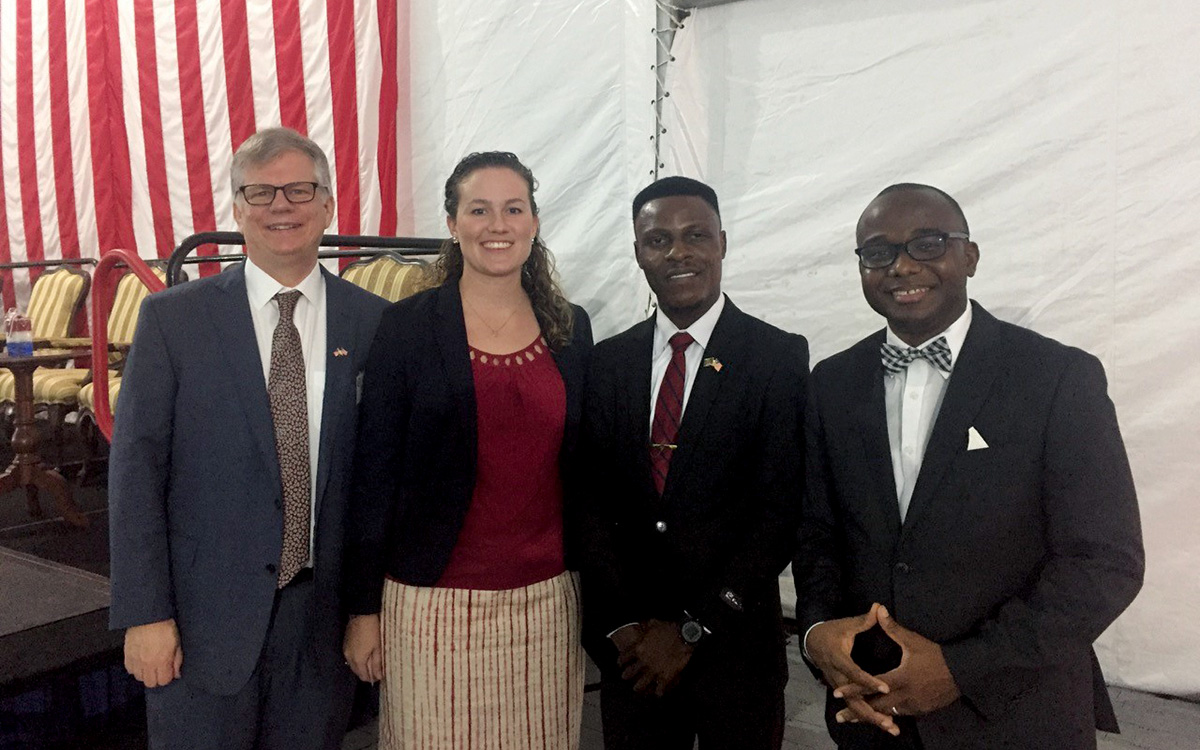
Rick Bassett with performers of the national anthem at an Embassy Monrovia July 4th event in 2019. From left to right: Bassett; Cortney Conrad Smyth, the embassy office management specialist who sang the American national anthem; Samson Tarpeh, director of the Agape National Academy of Music in Monrovia; and George Glomah Washington, a student-teacher at the academy.
Avis Bohlen Award for a Foreign Service Family Member
WILLIAM “RICK” BASSETT: CREATING COMMUNITY THROUGH MUSIC IN LIBERIA
Since September 2018, musician Rick Bassett has been an anchor of the U.S. embassy community in Monrovia, Liberia, according to Christine Elder, who served as the U.S. ambassador there until March. Mr. Bassett—an award-winning professional composer and orchestrator with numerous Broadway credits—has been creative and generous in sharing his time and exceptional talents to provide joyful interludes for American, Liberian and international colleagues there.

Rick Bassett, in blue shirt, poses with performers from his musical “Hope” in Uganda in 2019. From left to right: Byamugisha Gilbert, Bassett, Tayo Shonubi and Tamale Michael Patrick.
In the embassy’s first official Locally Employed Staff Appreciation Day, Mr. Bassett directed a chorus of American embassy staff, including Marines, in a choral performance, that featured his new arrangement of “My Favorite Things,” from “The Sound of Music,” in honor of the Embassy Monrovia local staff.
Here is a sample lyric:
Memos and emails and cultural advising
Training, maintaining, and much organizing
For all the things they do on our behalf
Thank you to all the Liberian staff!
Guard force and RSO keep us protected
ISC keeps our computers connected
Mailroom brings packages tied up with strings
These are a few of my favorite things!
“The effort to create such a unique ‘thank you’ was a gesture that our more than 350 LE staff—many of whom have been with the embassy for decades through civil wars and the Ebola epidemic—appreciated to the depths of their souls,” Ambassador Elder says of Mr. Bassett.
Mr. Bassett provided piano accompaniment when Saycon Sengbloh, the Liberian-American TV and Broadway star, visited Liberia in 2018. He also assisted in establishing A Dya Zu Zu, a nongovernmental organization in Liberia that helps local artists.
Because of the country’s deep historical ties and religious connections with the United States, many Liberians are familiar with both traditional and contemporary American gospel music. When the embassy hosted the U.S. gospel group “Oscar Williams and the Band of Life,” Mr. Bassett helped the public affairs section organize concerts and workshops that connected the group with local choirs and audiences. The free concerts and radio performances reached and inspired thousands of Liberians. The performances were all the more meaningful because they were the last embassy cultural events before the onset of the coronavirus in Liberia.
During the most stressful days of the pandemic, Mr. Bassett put his talents to use by teaming up with the post’s temporary regional medical officer to create a five-minute recording combining calming music and a meditative script to help relieve stress in the embassy community.
In addition to dedicating his musical talents to the greater good, he has been a frequent host for arriving families, and played a crucial role in supporting those who left abruptly on global authorized departure during the pandemic as well as those who remained at post. He and his wife, chargé d’affaires Alyson Grunder, organized numerous take-out and delivery meals.
Rick Bassett has used music to connect with embassy and local communities through five overseas tours. He has frequently performed the American and local national anthems for official events at post. In Ethiopia, he taught jazz at Addis Ababa University and at a local seminary; co-directed the “Motley Singers” chorus; and directed the international school’s jazz band. In Uganda, he was music director for several shows at the National Theatre, including “Hope,” a musical he wrote and composed in 2007 that was revived in Kampala in 2019. In Tokyo, he taught at Kunitachi College of Music.
Mr. Bassett and his wife have a daughter and a son. Throughout the family’s many moves, he has maintained his New York City–based professional life, providing orchestrations for musicals on Broadway and performances by the Boston Pops, the New York Pops, the National Symphony Orchestra and the Washington National Opera.
Mr. Bassett says he is “impressed by all Foreign Service family members as they find their own pathways to engage with overseas communities and support their families and careers.”
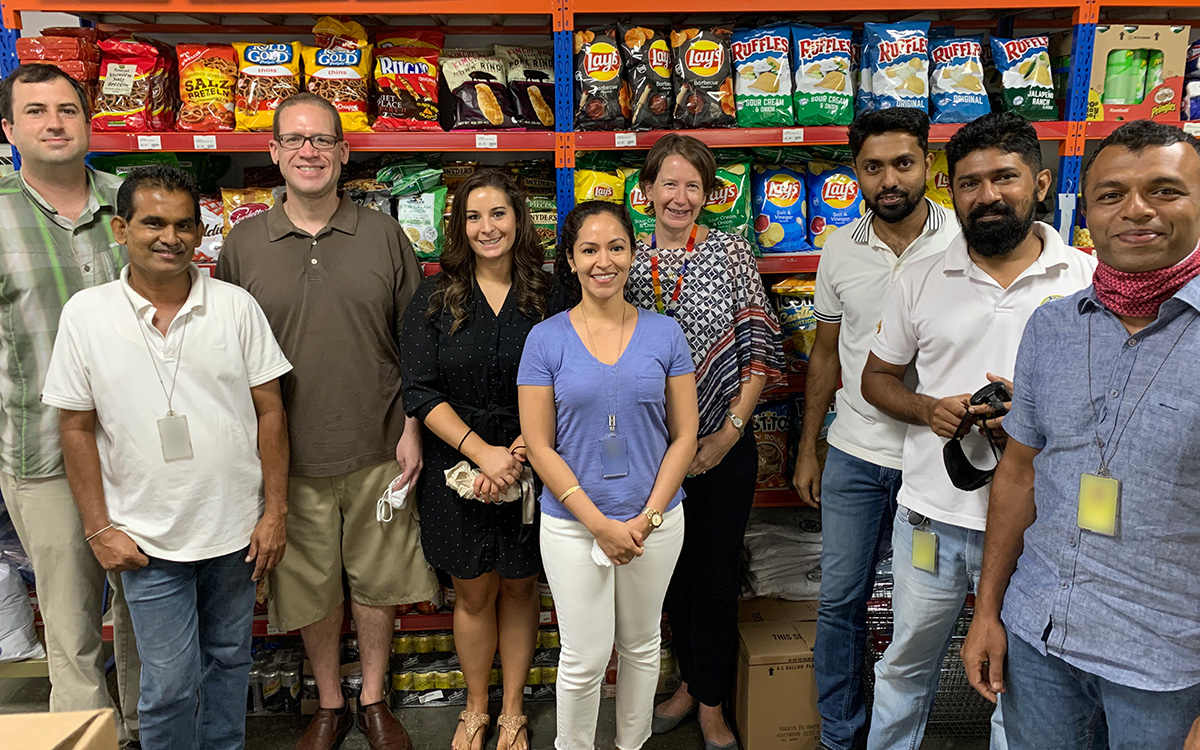
Jenny McCoy with board and staff from the AERAC. From left to right: Sean Peterson, Saman Mandawalla, Michael Cragun, Kristen Perry, Kelly Peters, McCoy, Srimal Kariyanwasam, Firaz Mahamood and Antony Kanappilly.
Nelson B. Delavan Award for an Office Management Specialist
JENNIFER “JENNY” MCCOY: GIVING EXTRAORDINARY SUPPORT TO EMBASSY COMMUNITY AFTER A TERRORIST ATTACK
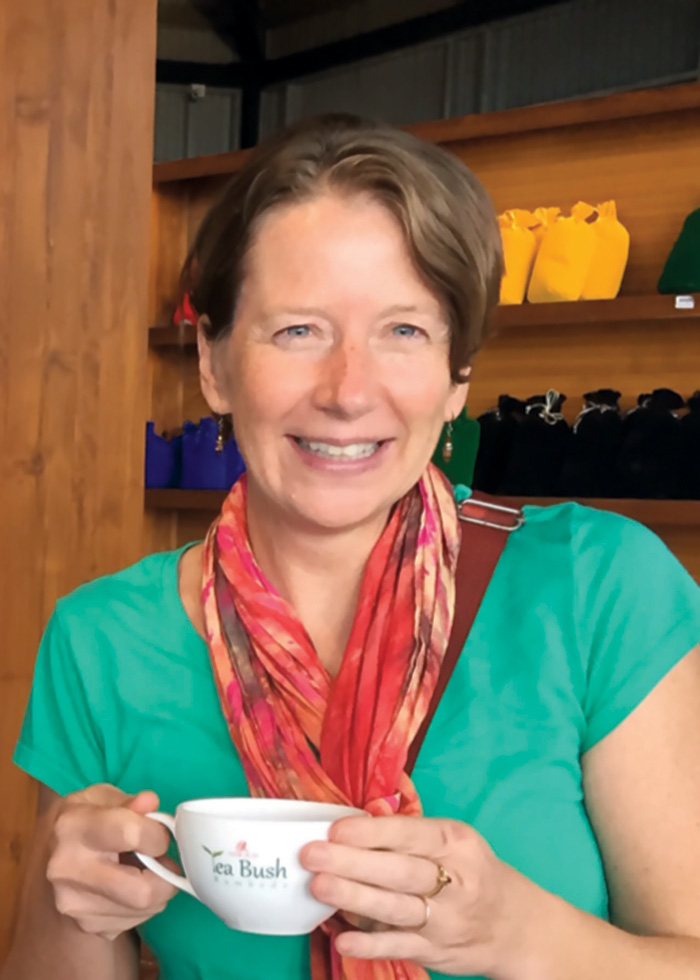
Jennifer McCoy.
During the Easter Day 2019 terrorist bombings in Colombo, Sri Lanka, suicide bombers attacked three churches and three luxury hotels, killing 269 people. Jennifer McCoy—the office management specialist (OMS) for the U.S. embassy’s Regional Security Office—was among the first employees to arrive at the embassy to deal with the aftermath. She made sure all embassy personnel were accounted for, while simultaneously bringing together key staffers for meetings.
Ms. McCoy quickly determined that there would be a significant reporting need, so she documented the timeline of events and actions by the embassy. This documentation proved essential in helping Washington, D.C., understand the unfolding situation. It also became a significant part of a “lessons learned” cable produced after the attacks.
When a wounded and traumatized temporary duty (TDY) employee appeared at the embassy covered in blood and debris, Ms. McCoy jumped into action, helping her shower, getting her clean clothes and providing crucial emotional support. As the board president of the American Employee Recreation Association of Colombo, Ms. McCoy gathered supplies from AERAC to provide clothing and food to other victims who came to the embassy. And working with the Community Liaison Office, she helped provide food for employees during the following week, as many worked night and day with no time to get meals.
Numerous TDY employees were sent to the embassy in the weeks following the attacks. The majority came to help with security, and Ms. McCoy became the control officer for dozens of them. She prepared diplomatic notes to get them visas and equipment, made hotel reservations, provided supplies, prepared office space and met other needs as they arose. Her support did not go unrecognized, as a steady stream of visitors stopped by to drop off challenge coins, sweets, coffee and other tokens of gratitude for Ms. McCoy.
“Being awarded this honor leaves me somewhat speechless,” she tells the FSJ. “I am touched beyond measure that my U.S. Embassy Colombo team nominated me, and that AFSA has chosen me as the awardee.”
Colleagues recognize her as an incredibly hard worker, an innovative thinker and a dedicated community servant with a constant desire to help others. She did such a good job as an OMS filling in temporarily for the Colombo front office that they ended up keeping her there for more than three months.
As president of AERAC, Ms. McCoy helped establish numerous recreational events for the community. Her financial guidance helped the association build a sizable reserve fund. During a government shutdown, she set AERAC up to fund short-term loans for embassy employees. The loans ended up not being needed, but the excess reserve funds are now being used to install a children’s pool at the AERAC recreational facility.
It really doesn’t matter where you are in the world; it’s the people you are with who make the difference.
—Jenny McCoy
Ms. McCoy credits the AERAC team she worked with. “They are phenomenal, and it was my privilege to be the president of the board,” she tells the Journal. In the wake of the COVID-19 pandemic, Ms. McCoy proved herself again as she found ways to support the community, working with her team to ensure food supplies and essentials were always available.
“I am so grateful to my family of colleagues in Colombo for their unwavering support and good humor despite some extremely challenging circumstances throughout the time of my tour,” Ms. McCoy says. “My RSO colleagues are among the best of the best, and it was my honor to work alongside them, as well as with the numerous TDYers who came to support us after the tragic events of the terrorist bombings.”
“To me, a post is all about the sense of community and the development of kinship from shared experience,” she adds. “It really doesn’t matter where you are in the world; it’s the people you are with who make the difference. I have always tried to be an active member of my community during my years as a military spouse and now as part of the Foreign Service. While I have never felt underrecognized, this award is validation that the importance I place on community is also appreciated and valued by others.”
Ms. McCoy, who hails from Iowa, is currently serving as the RSO OMS for U.S. Consulate Dubai. She and her husband, Shannon, were posted as a military family at embassies in Accra, Kyiv, Moscow and Nairobi before she joined the State Department Foreign Service as a specialist in 2018. As a military spouse, she had her own business as a dance and fitness instructor. The couple have two sons: Brendan, a newly commissioned naval officer, and Aidan, a freshman at Iowa State University.
M. Juanita Guess Award for a Community Liaison Office Coordinator
JENNIFER MAULDIN: BUILDING A SUPPORT NETWORK DURING COVID-19
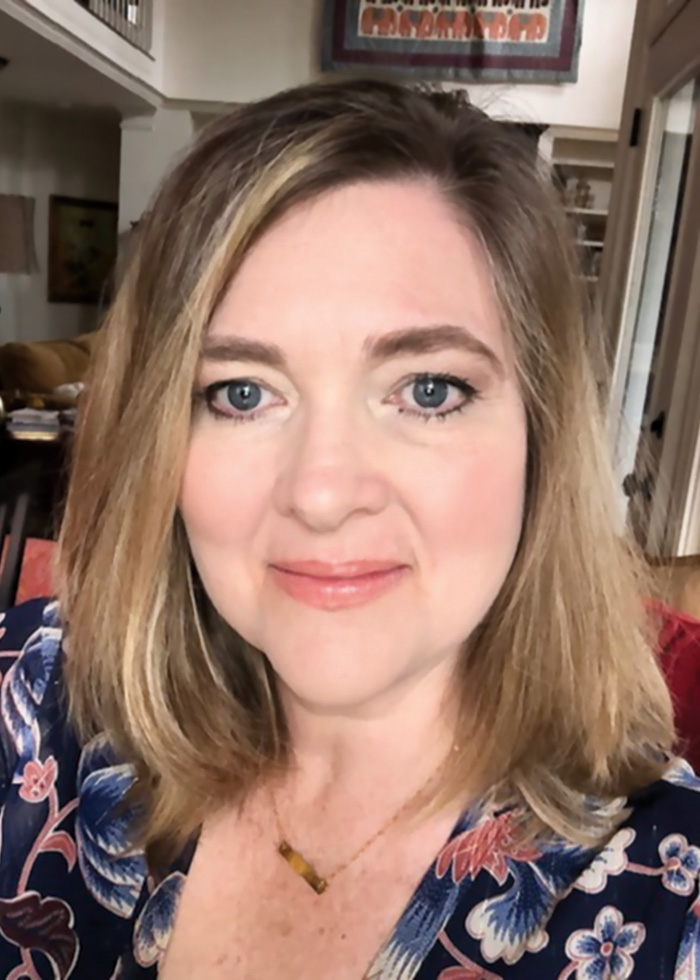
Jennifer Mauldin.
When the COVID-19 pandemic hit Pakistan, Karachi became the epicenter of the disease. Fifty percent of the consulate’s American staff there left on authorized departure. Eighty percent of its local staff began teleworking from home or went on authorized leave. Fortunately, Community Liaison Office Coordinator Jennifer Mauldin was there to help.
“One would think it would be impossible to maintain community with half of your American staff back in the United States in the middle of a worldwide pandemic. But Jennifer worked her magic,” Consul General Robert Silberstein wrote in nominating Ms. Mauldin for the M. Juanita Guess Award.
“I am honored and humbled to be selected for this award, but know that I am only one of many CLOs around the world working to strengthen their communities in difficult times,” Ms. Mauldin tells the Journal. “The Karachi community is so special. People are living for a year or two without their families, so developing a network of support, empathy and shared experiences is so important.”
Ms. Mauldin provided comfort and counseling for the consulate’s American staff. She launched virtual weekly meetings with staffers, and used the platform to share updates on COVID-19 and new department guidelines. These virtual meetings were an opportunity for the community to express their feelings and share concerns. Ms. Mauldin regularly wrote personal notes to every employee on authorized departure, checking on their health and welfare. She extended a helping hand to local employees, as well, assisting the consul general craft weekly messages to them and organizing a virtual town hall with post leadership and the Embassy Islamabad social worker. More than 100 local employees participated.
Americans remaining at post also struggled. Ms. Mauldin maintained community spirit by organizing virtual hail-and-farewell celebrations, connecting Karachi-based employees with those on authorized departure and organizing biweekly grocery orders and food deliveries from top restaurants.
She also volunteered to support the evacuation of American citizens, making hours of phone calls to American citizens who had registered to depart Pakistan and traveling to the airport to help process the roughly 1,000 American citizens the consulate facilitated on four U.S. government–chartered flights out of Karachi in April.
“Ms. Mauldin’s dedication and genuine care for each member of our consulate community is evident in all she does,” says CG Silberstein. “Her creativity, positive spirit and willingness to try new things—even during the most adverse circumstances—sets her far apart from all others and makes her worthy to be recognized as the Community Liaison Officer of the Year.”
Ms. Mauldin arrived in Karachi in the summer of 2018 and spent two years serving as CLO for the high-threat post in a city of more than 20 million. Given the security limitations and movement restrictions, she had to find creative ways for the community to experience Pakistan. Whether bringing a wedding ceremony onto the consulate property or coordinating consistent volunteer opportunities with local orphanages, Ms. Mauldin had the pulse of the community.
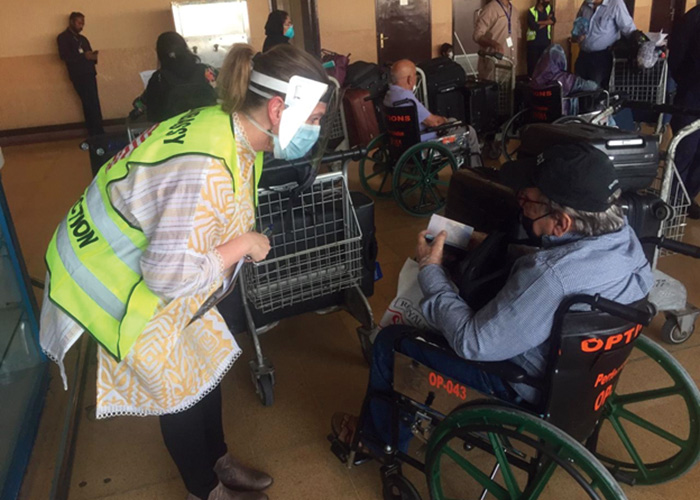
Jennifer Mauldin assists American citizens leaving Karachi on a U.S. government–chartered repatriation flight during the COVID-19 pandemic in early 2020.
During the summer of 2019, a series of equal employment opportunity (EEO) crises rocked the post at the same time as many newcomers, serving for the first time in a high-threat post, experienced culture shock.
“Jennifer was by my side as we navigated this threat to post resilience and effectiveness,” CG Silberstein says. “Together, we developed a new initiative called ‘Better, Safer, Stronger,’ that went beyond addressing EEO issues. We took a hard look at our alcohol policies, gender balance at events and SOPs for how we onboard new staff.” The result was stronger morale and higher productivity.
Adds Silberstein: “She cares deeply about the community and acted as my unofficial DCM and adviser, in addition to doing all ‘CLO things’ extremely well.”
Consulate staff report that during her tenure Ms. Mauldin was at the heart of many important mission successes, among them the 2020 U.S. Independence Day celebration, a 600-person event held in February to avoid the intense July heat.
Ms. Mauldin has spent 15 years as a Foreign Service family member traveling with her husband, Jimmy Mauldin, an economic-coned officer currently studying at the National Defense University Eisenhower School, and their four children. She served as CLO in Chennai, Rabat and New Delhi. She is now back in the United States working as a special assistant in the Office of the Inspector General.
Mark Palmer Award for the Advancement of Democracy
ALEXANDRA SHEMA: ESTABLISHING BUILDING BLOCKS FOR DEMOCRACY IN MOLDOVA

Alexandra Shema.
Political Officer Alexandra Shema’s leadership and engagement with political leaders, the opposition and civil society strengthened Moldova’s fledgling democracy. She provided timely analysis that was instrumental in shaping the embassy’s policy recommendations for Washington and supporting the country’s democratic reforms.
Last year, an unlikely coalition of pro-Western and pro-Russian opposition parties gave Moldova, long considered a “captured” state, its best chance in a decade for real democratic reforms. Ms. Shema’s reporting helped Washington navigate a weeklong standoff between dueling governments and rising tensions that threatened to turn violent. Her actions enabled the United States to send a timely and critical message to Moldova’s authorities: The international community would not tolerate repression. Ms. Shema’s efforts also helped genuinely independent institutions to flourish, reinforced U.S. leadership in Moldova’s democratic development and hardened its institutions against malign foreign actors.
Ms. Shema worked closely with the ambassador, the deputy chief of mission, USAID and the International Narcotics and Law Enforcement Bureau to reform Moldova’s justice sector. Her advocacy targeted $7 million in U.S. assistance to strengthen institutions and combat high-level corruption. Ms. Shema helped guide a range of actions to support these goals, including the appointment of a new, independent constitutional court and prosecutor general, the removal of several corrupt officials, and increased budgets and staffing for Moldova’s corruption-fighting institutions.
For me, this award is a recognition of the inspiring and exceptional work the entire Embassy Chisinau team has done to promote democratic values, free and fair elections, and justice reform in Moldova.
—Alexandra Shema
Ms. Shema also wrote a widely covered speech for the ambassador that laid out the United States’ expectations for Moldova’s anti-corruption and judicial reform. She choreographed and helped lead the first U.S.-Moldova Good Governance Dialogue, drawing on her network of contacts to facilitate an open discussion between the government, opposition parties and civil society. Participants praised her initiative as a model for building stronger checks and balances on the government; the Ministry of Justice now includes civil society and a wide range of stakeholders in ongoing public consultations.
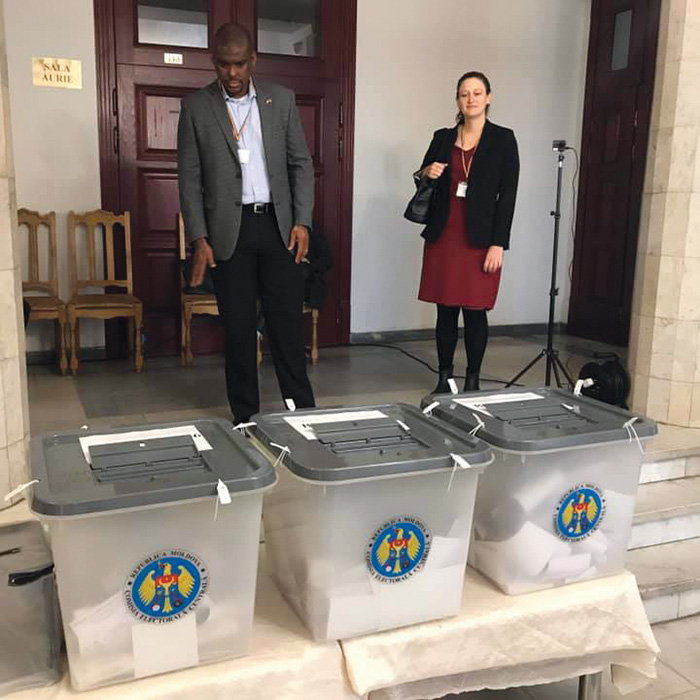
Ambassador Dereck J. Hogan and Alexandra Shema attend an election event in Moldova.
While the roots of democracy take decades to nurture, reforms Ms. Shema fostered in Moldova are already showing results. One significant example: The constitutional court, once subverted to oligarchic control, now has independent members who were installed during the pro-reform government’s brief tenure. And when Moldova’s current government later signed a problematic 200-million-Euro loan agreement with Moscow, the constitutional court ruled it was unconstitutional and undermined Moldova’s sovereignty.
“For me, this award is a recognition of the inspiring and exceptional work the entire Embassy Chisinau team has done to promote democratic values, free and fair elections, and justice reform in Moldova,” Ms. Shema tells the FSJ. “It is also a reminder that there is still a lot more work to be done, and an encouragement to keep fighting every day for the Moldovan people to have a more free, just, prosperous and democratic future.”
Alexandra Shema has served as the political officer at Embassy Chisinau since July 2018. She previously served as a human rights officer in Paris and as the immigrant visa chief in Guayaquil, Ecuador. She began her Department of State career in July 2009 as a Presidential Management Fellow, serving as a foreign affairs research analyst in the Bureau of Intelligence and Research, and later as a Belarus desk officer in the Bureau of European Affairs. Ms. Shema has a master’s degree in international affairs from the Georgia Institute of Technology and a bachelor’s degree in history from the University of Georgia. She speaks Romanian, French and Spanish.
Mark Palmer Award for the Advancement of Democracy
RAFAEL “RAFI” FOLEY: CHAMPIONING DEMOCRACY IN VENEZUELA
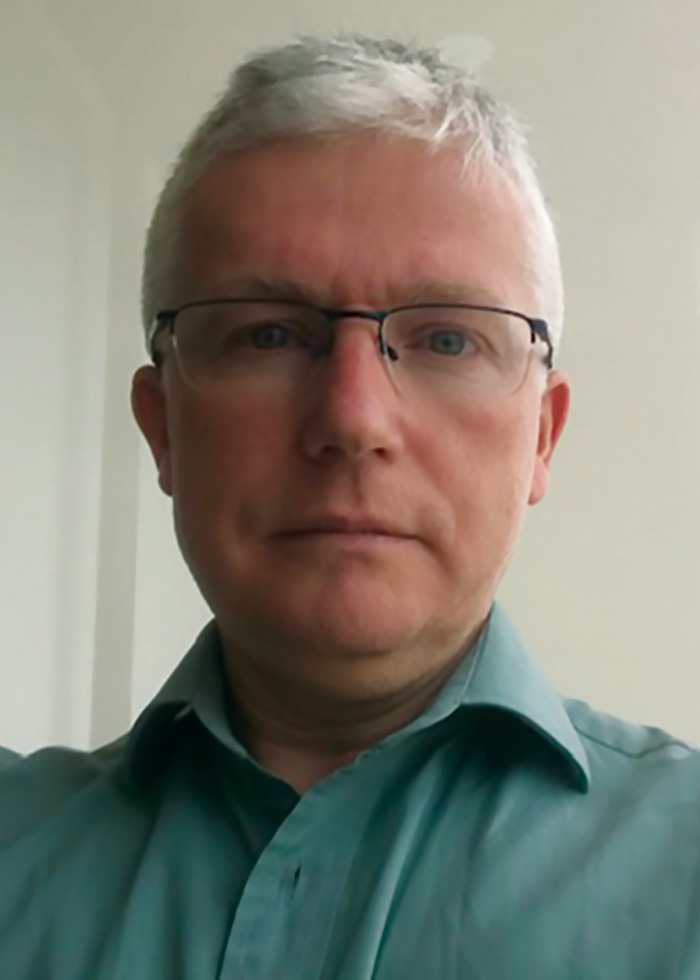
Rafi Foley.
The future of democracy and freedom in Latin America hangs in the balance in Venezuela. As political counselor and deputy chief of the U.S. Mission to Venezuela, Rafi Foley has been instrumental in fostering pro-democracy initiatives there in the face of an intractable regime that poses a dangerous human rights and security threat to the country and the region.
Venezuela’s de facto leaders have undermined democracy at home and abroad. Nicolás Maduro—still holding onto power after a contested 2018 election and indicted in the United States on drug charges—has links to Colombian and Middle Eastern terrorist organizations and to organized crime. The United States government and the Venezuelan opposition are determined to see democracy restored in Venezuela and have succeeded in constraining the Maduro regime’s reach and its totalitarian ambitions.
Mr. Foley has influenced democratic actors across the political spectrum in Venezuela, helping them to coalesce around common strategies and leaders. For example, he played a behind-the-scenes role in the election of a young legislator, Juan Guaidó, as president of the Venezuelan National Assembly. Shortly thereafter, Mr. Guaidó, backed again by a united opposition on the basis of an emergency provision of the Venezuelan Constitution, boldly assumed the interim presidency of Venezuela. Today, 60 countries, including the United States and the world’s largest democracies, recognize Mr. Guaidó as interim president.
In January 2019 Maduro gave all U.S. diplomatic personnel 72 hours to leave Venezuela. Secretary of State Mike Pompeo responded that Maduro had no authority to do so. The embassy drew down to 23 Americans, half of them security staff. Mr. Foley was selected to stay in Caracas to carry on his responsibilities as political counselor and became acting deputy chief of mission. In a tense stalemate with the regime, the embassy continued operating for several weeks.
On the Venezuela affairs team, both overseas and in Washington, we recognize the enormous implications of Venezuelans’ struggle to regain their freedom and fundamental human rights.
—Rafi Foley
Then, in early March 2019, all of Venezuela experienced major electricity blackouts. For several nights, all Americans were required to sleep in their offices. Water and fuel resources became unreliable, and the airport was intermittently closed. Secretary Pompeo ordered the withdrawal of all remaining U.S. personnel. Up until his last day in Caracas, Mr. Foley continued to support democratic actors there.
Back in the United States, Mr. Foley has been an indispensable member of the small team that made up the virtual U.S. Embassy Caracas, initially in Washington, D.C., and then in Miami, Florida. He worked on extended temporary duty in Bogotá, and his work there helped to convince the department to move the Venezuela team from Miami to Bogotá. The Venezuela Affairs Unit was established in Bogotá in August 2019 as a functionally independent post focused on returning democracy to Venezuela and supporting the heroic struggle of Venezuelan democratic actors. Mr. Foley became its deputy chief.
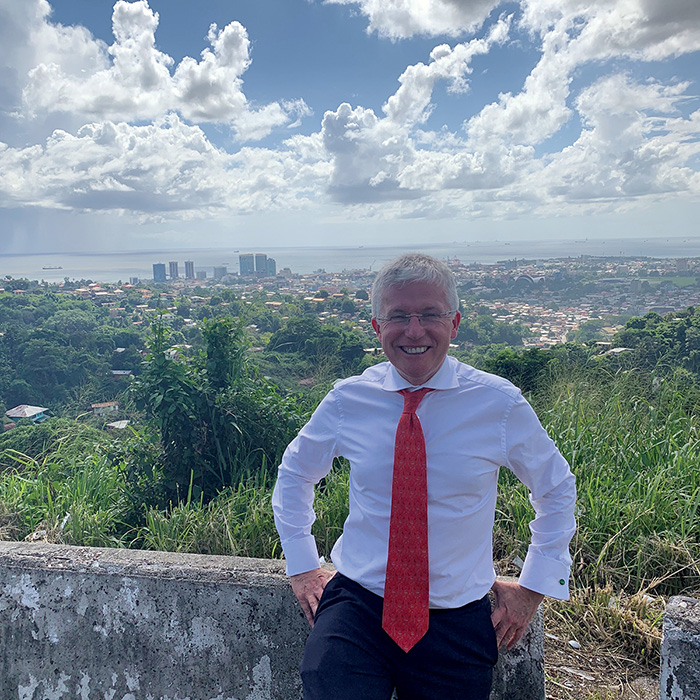
Rafi Foley visiting Port of Spain in October 2019.
Mr. Foley’s work to restore democracy in Venezuela has continued at an unrelenting pace at the VAU. As a direct result of the VAU’s teamwork, and Mr. Foley’s contributions to it, there is intense pressure on President Maduro, preventing him from consolidating power and keeping in check his ability to undermine democracy in neighboring countries.
“On the Venezuela Affairs team, both overseas and in Washington, we recognize the enormous implications of Venezuelans’ struggle to regain their freedom and fundamental human rights,” Mr. Foley says. “I feel the Palmer Award is also a recognition of their valiant efforts and personal sacrifices.”
Mr. Foley tells the FSJ that he is humbled to receive the award, adding: “I am proud to work side by side with dozens of U.S. government colleagues and Venezuelan opposition leaders and activists, whose commitment is an inspiration and a testament to the resilience of human beings’ uncompromising longing for freedom and the pursuit of happiness.”
He was recently promoted to the Senior Foreign Service and currently serves as deputy chief of the Venezuelan Affairs Unit in Bogotá. He has also served in Caracas, Managua, Baghdad, Islamabad, Geneva and Malabo. His assignments have been in the areas of human rights, humanitarian affairs, multilateral diplomacy and support for democracy.
Mr. Foley holds a bachelor’s degree in political science from Montclair State University in New Jersey, a master’s degree in international relations from Columbia University in New York and a certificate in the Social Doctrine of the Catholic Church from the Pontifical Lateran University in Rome. He was born and grew up in Spain. He is fluent in Spanish and Italian.
AFSA Achievement and Contributions to the Association Award
JASON VORDERSTRASSE: HONORING EARLY DIPLOMATS WHO DIED OVERSEAS

Jason Vorderstrasse.
Foreign Service Officer Jason Vorderstrasse has made it his mission over the past 13 years to discover and honor early American diplomats and consular officers who died overseas in the line of duty but whose names were unknown when AFSA unveiled its original Memorial Plaque in 1933. His diligent efforts over more than a decade have served to advance AFSA’s role as the professional association of America’s diplomats by highlighting the distinctive risks of overseas service.
In 2007, Jason Vorderstrasse was an entry-level FSO serving in Hong Kong. A colleague told Mr. Vorderstrasse that he had visited a local cemetery and seen the grave of a U.S. diplomat whose name was not inscribed on the AFSA Memorial Plaques. Mr. Vorderstrasse visited the cemetery and found the gravestone. Conducting online and archival research, he established that U.S. Consul F. Russell Engdahl died in 1942 while a prisoner of the Japanese military. Additional research identified two U.S. envoys who died of disease in Macau in 1844. Mr. Vorderstrasse nominated all three for inscription on the AFSA Memorial Plaques, and AFSA unveiled their names on Foreign Service Day 2009.
But that was only the beginning of Mr. Vorderstrasse’s efforts. Over the past decade, he has dedicated hundreds of additional hours researching in the ProQuest Historical Newspapers database, Google Books and other online references, along with the archives of the State Department’s Office of the Historian, to find and document more early consular officers and diplomats who merit inscription of the AFSA Memorial Plaques.
“When I first began researching the lives of deceased diplomats 11 years ago, I had no idea that until the early 20th century there had been no organized effort to mark the deaths of those who died in tragic or heroic circumstances,” Mr. Vorderstrasse tells the FSJ. “It is a credit to AFSA that the organization took on this task almost 100 years ago, and it has been my privilege to play a small role in helping ensure that these heroes are not forgotten.”
His task was complicated by the fact that hundreds of U.S. envoys have died overseas during the last 240 years, but AFSA does not inscribe the names of those who died of natural causes. Mr. Vorderstrasse’s research not only had to identify the previously overlooked deaths but had to document that they qualified for inscription due to having died from tropical diseases, violence, accidents while in official transit or other circumstances—distinctive risks of overseas service.
It is a credit to AFSA that the organization took on this task almost 100 years ago, and it has been my privilege to play a small role in helping ensure that these heroes are not forgotten.
—Jason Vorderstrasse
His research was painstaking. For each case, he reviewed multiple primary-source documents (such as contemporaneous newspapers, books, family histories, college alumni reports and genealogical records) to ensure that the date, place and circumstances of death were accurate. In many cases, he consulted with State’s Office of the Historian to examine official records. He then compiled that documentation for review by AFSA’s Awards and Plaques Committee.
As his research advanced, Mr. Vorderstrasse personally visited several final resting places of these early envoys. Finding some of the graves suffering from poor upkeep, he convinced cemetery authorities in Southampton, New York, to refurbish the gravesite of Robert Sterry, who died in a shipwreck while returning from France in 1820. His research into the three U.S. diplomats buried at the Old Protestant Cemetery in Macau led to a memorial ceremony there.
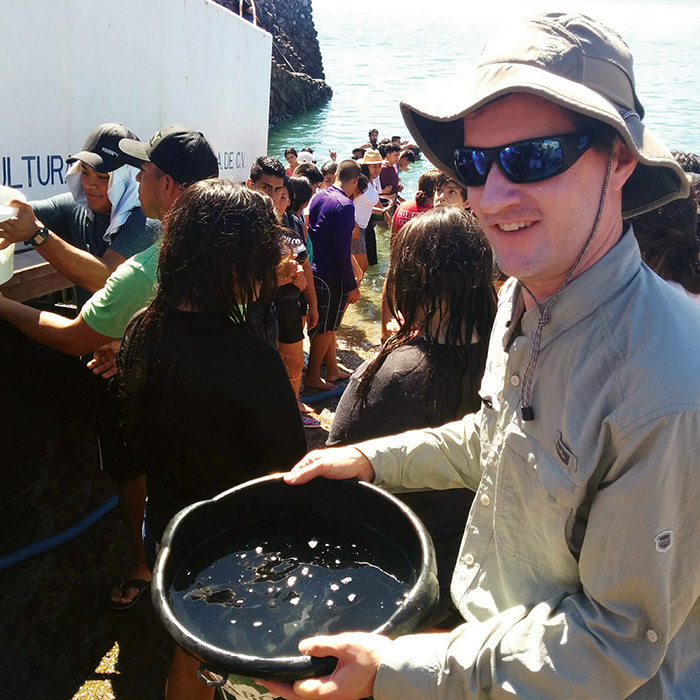
Jason Vorderstrasse, about to release endangered totoaba fingerlings, in Puertecitos, Baja California, Mexico in February 2016.
In a March 2014 Foreign Service Journal essay, Mr. Vorderstrasse reported documenting an additional 32 names of diplomats and consular officers who died overseas in the line of duty. By 2019, the number had risen to 39.
In December 2019, on the recommendation of the AFSA Awards and Plaques Committee, the AFSA Governing Board voted to add those 39 names to the plaques (along with nine other historical names documented by two other AFSA members) when funding is available to install and inscribe additional marble plaques. In early 2020, he nominated five additional names that the Governing Board approved in June 2020. This was followed by one additional name in 2020. He shares his story of this project in the November Foreign Service Journal, “America’s Overlooked Diplomats and Consuls Who Died in the Line of Duty.”
AFSA is currently coordinating with the Department of State’s Bureau of Administration in hopes of adding additional memorial plaque space on which to inscribe these names in time for the annual AFSA Memorial Plaque ceremony in May 2021. For now, the names are memorialized on a virtual plaque on the AFSA website at afsa.org/memorial-plaques.
“Research is generally a solitary process, so receiving this award is welcome recognition of the value of the many hours I have spent in archives, cemeteries and online,” Mr. Vorderstrasse says. “When the new plaques are unveiled with additional rediscovered names, I hope it will inspire those who pass through the C Street lobby to learn more about those who gave their lives as part of our shared work to advance U.S. diplomatic initiatives around the world.”
Jason Vorderstrasse is currently serving as the diplomat in residence for Southern California, Hawaii, Nevada, American Samoa, Guam and the Northern Mariana Islands. He joined the State Department in 2004, and has previously served in Kingston, Hong Kong, Tijuana and Washington, D.C. He holds a law degree from Golden Gate University and a bachelor’s degree in international relations from Pomona College.
AFSA Special Achievement Award
JAMES YORKE: WORKING FOR MEMBERS, AN UNSUNG HERO
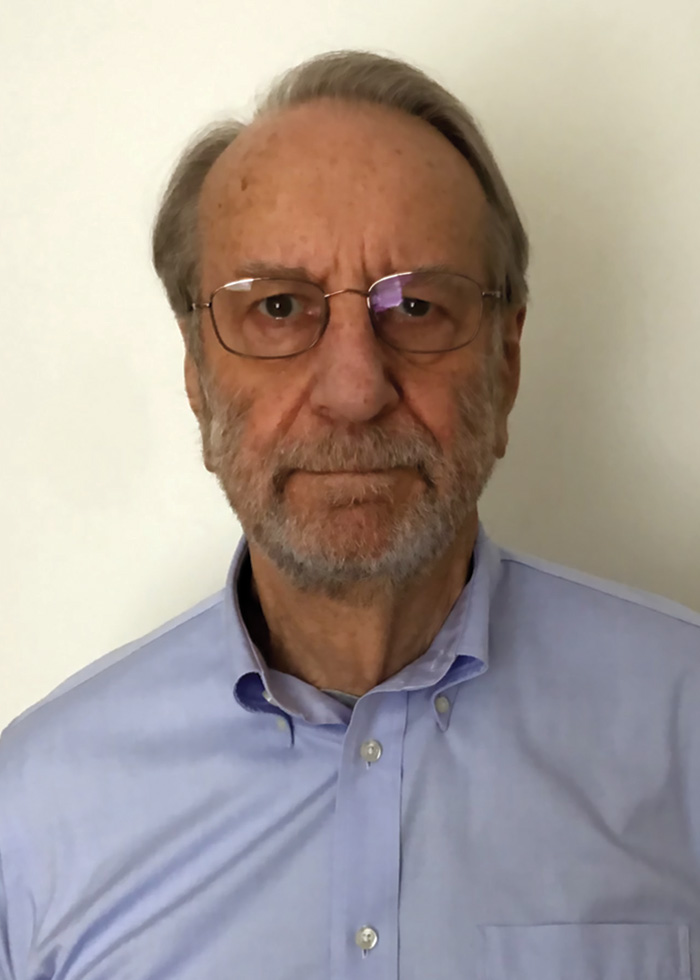
James Yorke.
AFSA Senior Labor Management Adviser James Yorke is an unsung, behind-the-scenes hero who has directly assisted thousands of AFSA members during his 25 years with the association. There may be no one at the State Department who knows more than Mr. Yorke does about the rules, regulations and laws regarding travel, transportation, allowances and assignments. In many cases, he has assisted in negotiating those Foreign Affairs Manual provisions. Armed with this deep knowledge, he has convinced the department hundreds of times to extend benefits to employees who State initially said did not qualify. He has helped convince state governments to offer in-state tuition rates to the children of Foreign Service members who are domiciled but not physically present in those states, saving Foreign Service members thousands of dollars.
Mr. Yorke’s excellent, long-term relationship with Charleston Global Financial Services has made it possible for AFSA to assist many employees suffering from payroll errors and unjustified debt collection efforts. Members panicked by a collection notice for an indebtedness they were never notified they had incurred have, after Mr. Yorke has intervened, received the welcome news that the collection notice was being canceled. In one case, Mr. Yorke helped a member recoup more than $20,000 in per diem expenses that Charleston had disallowed.
Mr. Yorke’s responsiveness to member inquiries is legendary. He typically provides comprehensive and authoritative responses to members within 24 hours. AFSA’s attorneys and grievance counselors, Governing Board members and the retiree counselor turn to him for expert input in cases involving allowances and active-duty benefits and other matters.
Mr. Yorke is tenacious in advocating for members who have been wronged by the system. At the same time, he employs “tough love” with members who have no case so they can get on with their life and career without wasting time. He is a patient teacher and generous about sharing his knowledge and experience with his colleagues, thereby strengthening AFSA’s entire Labor Management team.
While AFSA governing boards sometimes have been accused of focusing more on career issues for Foreign Service officers ahead of specialists, Mr. Yorke has taken the lead for AFSA in assisting Foreign Service specialists (who outnumber generalists). For example, he has negotiated with the State Department to improve the career path for office management specialists, and has worked extensively on issues involving information management specialists and Diplomatic Security agents.
James is an essential member of the AFSA Labor Management team. We could not keep up with all the demands placed on the Labor Management team without James’ consistent and tireless efforts, his encyclopedic knowledge of the rules and regulations, and his willingness to help his LM colleagues out.
—AFSA General Counsel Sharon Papp
Mr. Yorke gets involved in assisting with cases involving the other foreign affairs agencies, as well—ably assisting members of the U.S. Agency for International Development, Foreign Commercial Service, Foreign Agricultural Service, Animal and Plant Health Inspection Service and U.S. Agency for Global Media in similar issues relating to allowances, medical clearances, spousal employment and grievances. He has also provided invaluable assistance to colleagues within Labor Management on negotiations of the various collective bargaining agreements (such as the FAS and APHIS framework agreements), institutional issues such as a move by USAGM to essentially do away with the Foreign Service Correspondents Corps, and standard operating procedures for those agencies.
For two decades, Mr. Yorke has compiled AFSA’s annual tax guide—valued by members as one of the top benefits of belonging to AFSA. He has written many columns in The Foreign Service Journal’s AFSA News section and posted on AFSA’s website articles detailing the ins and outs of employee allowances and benefits.
“James is wonderful. No one at AFSA is easier to work with,” says FSJ Editor Shawn Dorman. “He always either knows the answer to any question, or he knows how to find it.”
“James is an essential member of the AFSA Labor Management team,” AFSA General Counsel Sharon Papp, who has worked with Mr. Yorke for 25 years, tells The Foreign Service Journal. “We could not keep up with all the demands placed on the Labor Management team without James’ consistent and tireless efforts, his encyclopedic knowledge of the rules and regulations, and his willingness to help his LM colleagues out.”
Born in the United Kingdom, James Yorke was first hired by AFSA in 1992 after 30 years of service in the British Navy. He worked with AFSA until 1995, when he accompanied his FSO wife, Jean Louis, on an assignment to Bogotá. He returned to AFSA in 1998, where he has worked ever since. He has been living and working from North Carolina since 2010.
2020 AWARDS RUNNER-UP
Nelson B. Delavan Award Runner-Up for an Office Management Specialist
JEAN MONFORT: BOOSTING MORALE IN CONAKRY
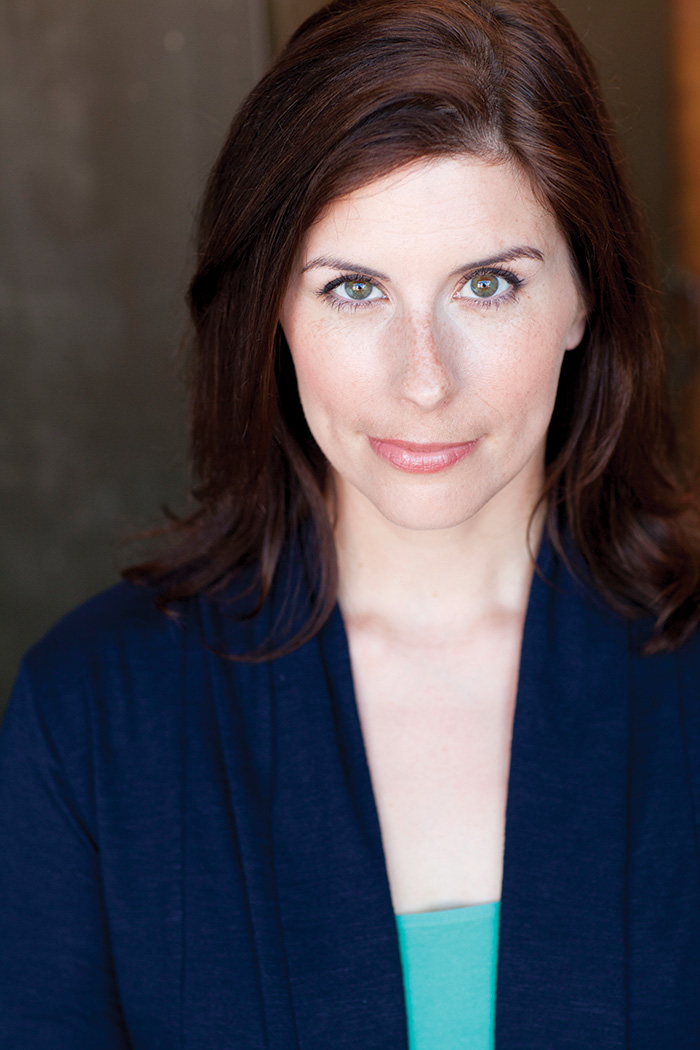
Jean Monfort.
Serving at U.S. Embassy Conakry in Guinea, Office Management Specialist Jean Monfort stretched far past the responsibilities listed in her job description. Stationed in the Regional Security Office, she has made strong contributions to the mission, helping to build morale and improving perceptions of the post.
With no prior training, Ms. Monfort took on the role of ePerformance human resources officer for the mission, working remotely with the regional human resources officer to handle the Employee Evaluation Report season. For a time, she was the only OMS at the mission. She found a way to split responsibilities between the front office and the RSO. She has also helped other sections, including assisting the political-economic section as a control officer for an ambassadorial trip upcountry.
In the absence of a community liaison office coordinator (CLO) at post, Ms. Monfort stepped up to keep the mission engaged. She organized a dining club to show newcomers and temporary duty employees the city. She put together trips both in and out of the capital, encouraging people to shed their preconceived notions of Guinea. Her coworkers nicknamed her “Shadow CLO.” One of her biggest achievements was creating Conakry’s new post video, which has been met with overwhelmingly positive feedback.
Ms. Monfort also participated in the public affairs English language program as a regular volunteer at the Thurgood Marshall Information Resource Center. She made it a point to bring in USAID and other organizations when she took over as chair of the First and Second Tour (FAST) Officer and Specialist’s committee. In short, her personal modus operandi is one where there are no “tribal” departments, but a singular mission.
“Posts are like ecosystems,” she tells the Journal. “This means in tough places—and Conakry can be tough—it’s important to build a community, one that stretches out past your office or section. If we are one team, that means we have to contribute when we are able. It is the only way, not just to survive, but thrive. This is not easy. It can be infuriating. It requires being stubborn and unashamedly optimistic.”
Jean Monfort brings an eclectic background to the State Department. She has worked as a college professor, children’s puppeteer and singer, legal administrator and editor in chief, among other things. She and her husband were married via Montana proxies while living in Guinea. She joined the Foreign Service in 2018 and is excited about where this life will lead her.



